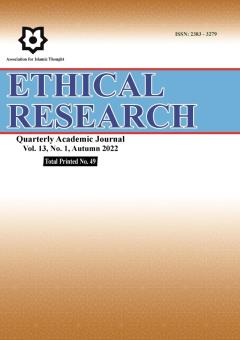-
-
List of Articles
-
Open Access Article
1 - An explanation of validation in Islamic thought: ethical jurisprudence
tahereh pournemati shams abad Maryam shahrivar -
Open Access Article
2 - Analysis of the Principles of Islamic Education in the Mystical Thoughts of Imam Khomeini(RA)
jamshid Sadri hatef siahkoohian Seyed Hojjat Mahdavi Saeedi Ahya Dakmaei -
Open Access Article
3 - Ethical Approaches in Determining Blood Money and Arsh based on Medical Priorities
Narges Dehghani Mohammad Rasoul Ahangaran Maryam Naghdi Dorobati Karim Salehi -
Open Access Article
4 - riticism of feminist arguments on "freedom of abortion due to moral rights of mother and fetus" based on fundamental methodology in moral philosophy
Narges Roodgar zeinab kabiri -
Open Access Article
5 - Functions of temporary marriage in the moral health of society
jahanbakh qadiri -
Open Access Article
6 - Cultural and social interaction and confrontation between Muslims and Christians in Andalusia
Masood Farshidnia zahra hamedi Mojtaba Khalife -
Open Access Article
7 - Analysis of the virtues and capabilities of Lili in the system of Lili and Majnoon Nizami from the point of view of positive psychology
Narges Keshavarzi kobra nodehi -
Open Access Article
8 - A Study of Behavioral Duality and Social Discrimination of the Soviet Government in the Asylum Seek of the Democratic Sect in 1325
ghader kiyani -
Open Access Article
9 - Examining the moral requirements and observing the citizen's rights of the accused during the arrest phase
Abbas Gohari Abbas Tadayon Abdoljabar Zar Goshi Nasab -
Open Access Article
10 - Analysis of the jurisprudential (Fiqh) foundations of the six areas of education and training in the document of the fundamental transformation of education
Hasan Mohammadpoor Mohsen Malek Afzali Ardakani Ali hemat banari -
Open Access Article
11 - Equality in the opinions and opinions of the Guardian Council with emphasis on human dignity
mehdi meftahi sayed mohammad sadegh Ahmadi ghodrat allah noroozi baghkmeh -
Open Access Article
12 - Psychological research of the spiritual education of the Islamic way of life
seed mohamad noorollahi Mohammad Ali Rezaei Isfahani mahmud ghayumzadeh -
Open Access Article
13 - Investigating the moral and social effects of divorce in popular jurisprudence
abdolhamid navardi aboalghasem asi moznab Ahmad sadeghian -
Open Access Article
14 - The components of humility and tolerance from the perspective of the Holy Quran and the traditions of the innocents (peace be upon them)
Zeinab Maleki Babhoveizi mohammadreza abooei azam atemadifard -
Open Access Article
15 - Explaining the moral value view of complementary and secondary punishments
Zakiye Ebrahimzadeh Ahmad Bagheri Esmaiel Rahimi Nejad
-
The rights to this website are owned by the Raimag Press Management System.
Copyright © 2017-2026







